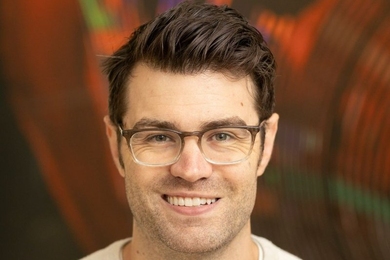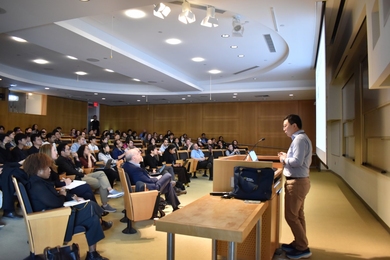Global warming may be a hot topic of conversation among scientists and political policymakers, but when it comes to swaying public opinion, the subject leaves most Americans cold, according to David Konisky PhD '06, associate professor of public and environmental affairs at Indiana University.
“Global warming is not an major factor for Americans when judging energy sources,” Konisky says. “Most of the public isn’t willing to pay very much to address climate change.”
Konisky is a 2006 PhD graduate of the MIT-SHASS Department of Political Science, which observes its 50th anniversary this fall. He was on campus Thursday, Sept. 17, to present a talk entitled, “Cheap and Clean: How Americans Think About Energy in the Age of Global Warming.” The talk, sponsored by the MIT Energy Initiative (MITEI), summarized the key findings of Konisky’s award-winning 2014 book of the same title, which he co-authored with Harvard University professor of government, Stephen Ansolabehere.
Americans have a consumer point of view about energy
Konisky said their research found that Americans look at energy the way they look at other consumer products — by weighing key attributes: In the case of energy, Americans care most about financial cost and local environmental harm.
This consumer-type analysis trumps other biases one might expect to see in this arena, Konisky said. “It turns out that just knowing how people perceive the environmental harms and economic costs of energy sources explains about 80 percent of the variation in their attitudes [toward the use of various fuels]. Other factors — like political preferences, education, and income — don’t really matter much.”
Which fuels do Americans prefer?
Working in conjunction with MITEI, Konisky and Ansolabehere spent a decade surveying representative samplings of Americans to determine how they think the country should meet its growing demand for electricity — with more, less, or the same amount of seven power sources (coal, natural gas, nuclear, oil, hydro, wind, and solar). They found that Americans want energy that is both cheap and clean.
“But we don’t have cheap and clean,” Konisky said, “so there’s a tradeoff required.”
When asked to make choices, Americans say they want to reduce the use of fossil fuels, particularly coal and oil, and hugely favor the increased use of renewable energy — solar, hydro, and wind. However, most people believe renewables are less expensive than they actually are, Konisky noted. “People get costs right for traditional fuels," he said, "but they’re optimistic about [the cost of] renewables.”
Americans respond to local, rather than global, impacts
Interestingly, when it comes to the question of harm, researchers found people are significantly more moved by local health effects and environmental damage than they are by global impacts, Konisky said.
“People are concerned about local water pollution, local air pollution. There’s not a lot of latent demand to address global climate change directly,” he said.
These attitudes have a direct impact on policy. Konisky said Americans were found to prefer regulations that cap emissions or set standards for the use of renewable energy over policies that are more efficient at cutting greenhouse gas emissions — for example, cap and trade (regulation using tradeable allowances) or carbon taxes (usage or production taxes).
“Why is this? We think it’s related to how people think about energy,” Konisky said. “We think the evidence suggests people prefer regulation because they believe it goes after the things they value, particularly local environmental impacts. They do not make the same connection for other policies. They see these as ‘climate’ policies, and they are less supportive of 'climate policies' than they are of 'environmental policies.'”
Konisky notes that because citizen demand for "climate policy" is so soft in this country, new tactics are needed to address global warming.
How the U.S. can advance energy and environmental policy
In their book, Konisky and Ansolabehere recommend policies that target both local pollutants and carbon emissions (the main source of global warming). The local and immediate nature of people’s energy concerns, they say, can be the starting point for a new approach to energy and climate change policy.
“You can think about addressing climate change without talking about ‘climate change.’ You can talk about ‘going after emissions’ in a variety of ways. You could go after ‘local environmental harms.’”
The bottom line, according to Konisky, is that the terms “climate change” and “global warming” — terms that refer to the issue in a vast, global sense — seem so abstracted from people's local reality, and are so polarizing, that it can be counterproductive to talk about the issues using those terms.
"The U.S. can help the world move toward a cleaner energy economy," Konisky said in an earlier talk at Indiana University, "but the strategy should focus on the local impacts from energy use instead of seeing it as a global-size issue.”











